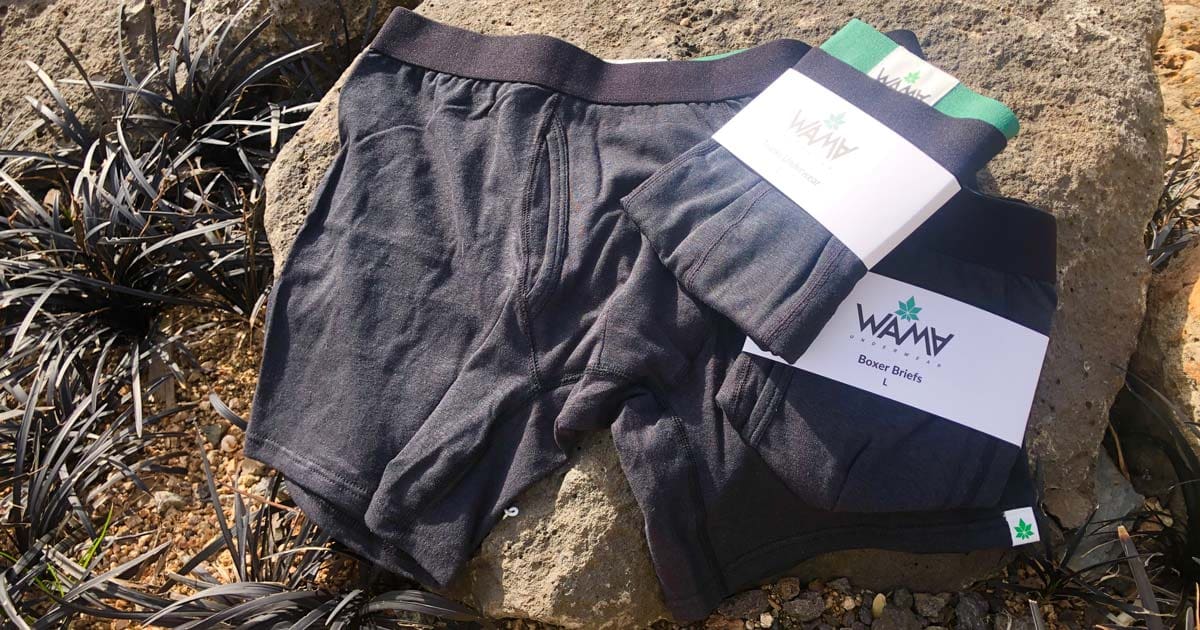Field test and review
When it comes to outdoor activities like hiking, having the right gear is essential for comfort and performance. While many hikers focus on selecting the perfect hiking boots, backpacks, and clothing, one often overlooked item is underwear. Enter hemp underwear, a sustainable and comfortable choice that’s gaining popularity among outdoor enthusiasts. In this article, we will explore the benefits of hemp underwear for hiking and why it’s worth considering for your next adventure.
I was recently contacted by WAMA Underwear and asked if I’d be keen to test out their gear. I’m always keen to see how different fabrics perform so they sent me a couple of pairs of organic cotton & hemp underwear to try. Don’t worry, I won’t be sharing any pics of me wearing them.
The first question I asked was why hemp? According to WAMA, hemp fabric is naturally anti-bacterial, with anti-odor properties. Super comfortable, breathable and gets softer with every wash. Hemp is also organic, eco-friendly and can help save the planet. Hemp is the perfect fabric for your underwear. Sounds ideal for hiking.
Here’s a bit of info about the benefits of hemp and my thoughts on how the WAMA mens boxer briefs performed.

Hemp fabric
Hemp fabric, derived from the versatile hemp plant, has been used for centuries due to its durability and strength. When it comes to hiking underwear, these qualities are of utmost importance. Hemp fabric is known for its resistance to wear and tear, making it highly suitable for rugged outdoor activities. It can withstand constant movement, friction, and stretching without losing its shape or breaking down. Given I have only just received this underwear and have only worn them several times, I will have to get back with an update about the durability in a few months time.
Exceptional moisture-wicking properties
Hiking can be physically demanding, causing sweat and moisture to accumulate. One of the key advantages of hemp underwear is its exceptional moisture-wicking properties. Hemp fibers naturally wick away moisture from the body, keeping you dry and comfortable during long hikes. Unlike synthetic materials, hemp allows your skin to breathe, preventing the buildup of sweat and minimising the risk of chafing or irritation. It is getting close to winter in Victoria so they days weren’t overly hot when I tested this underwear. I did head out on few steep and challenging hikes though so I could work up a good sweat. Even though the underwear has a reasonable percentage of cotton (53% hemp, 44% organic cotton and 3% spandex) which doesn’t wick moisture well, I found the hemp’s ability to draw perspiration away was comparable to the merino underwear I have.
Temperature regulation and breathability
Maintaining the right body temperature is crucial while hiking, especially in changing weather conditions. Hemp fabric possesses excellent thermoregulation properties, helping to keep you cool in hot climates and warm in colder environments. The breathability of hemp underwear allows air to circulate, preventing overheating and reducing the risk of unpleasant odors caused by bacterial growth. As with the wicking qualities mentioned before, I found the breathability of the hemp fabric worked really well. The mens boxer briefs are soft, flexible and comfortable to wear. They were not too tight or too lose, allowing plenty of flexibility and room to breathe.
Sustainability and eco-friendliness
For environmentally conscious hikers, hemp underwear is an ideal choice. Hemp is a highly sustainable crop that requires minimal water, pesticides, and herbicides to grow. It also grows quickly and abundantly, making it an eco-friendly alternative to traditional cotton. By choosing hemp underwear, you’re making a positive impact on the environment and supporting sustainable practices in the textile industry. It is worth noting again that the WAMA underwear is made up of 53% hemp, 44% organic cotton and 3% spandex.
Hypoallergenic and skin-friendly
Hemp fabric is naturally hypoallergenic and gentle on the skin. If you have sensitive skin or are prone to allergies, hemp underwear can be an excellent solution. It is free from harsh chemicals and synthetic additives commonly found in other fabrics. Additionally, hemp fabric becomes softer and more comfortable with each wash, ensuring a pleasant experience even during extended hiking trips. Fortunately I don’t have any allergies or sensitivities although I have had chafing on quite a few hikes when I’ve worn my stock standard (non hiking) undies. Even though the WAMA underwear felt a bit stiff on the first couple of hikes, it softened considerably after washing and repeat wear. I’m pleased to say there has been no chafing when wearing these ones.
Durability and longevity
Investing in high-quality gear is essential for any outdoor enthusiast, and hemp underwear claims to be a durable choice. The strength of hemp fibers ensures that your underwear will withstand repeated use and maintain its integrity over time. It is resistant to pilling, stretching, and fading, making it a long-lasting investment for your hiking wardrobe. I’ll be interested to see how the fabric performs over time as I have always found my merino underwear gets out of shape after a few months of wear. As mentioned earlier, I have only recently received this underwear and have only worn them several times so, I will have to get back with an update about the durability and longevity in a few months time.
Final field-test thoughts
When it comes to hiking gear, don’t overlook the importance of comfortable and sustainable underwear. Hemp underwear offers a range of benefits for outdoor adventurers, including durability, moisture-wicking properties, temperature regulation, and eco-friendliness. By opting for hemp underwear, you’re not only prioritising your own comfort but also contributing to a more sustainable future. So, consider gearing up with WAMA hemp underwear for your next hiking adventure and experience the incredible combination of comfort, performance, and environmental responsibility.
How does hemp compare to merino?
Hemp and Merino wool are both popular choices for outdoor clothing, including underwear, due to their unique properties. Here’s a quick comparison of hemp and Merino wool to help you understand their differences.
Moisture-wicking and breathability
- Hemp: Hemp fabric has excellent moisture-wicking properties, drawing moisture away from the body and keeping you dry. It is also highly breathable, allowing air to circulate and prevent overheating.
- Merino Wool: Merino wool is renowned for its exceptional moisture-wicking ability. It can absorb moisture up to 30% of its weight without feeling wet, keeping you comfortable and dry during physical activities. Merino wool is also highly breathable and regulates body temperature effectively.
Temperature regulation
- Hemp: Hemp fabric offers good thermoregulation, helping to keep you cool in hot weather and warm in cooler temperatures. It allows air to flow and prevents overheating, but it may not provide as much warmth as Merino wool in colder conditions.
- Merino Wool: Merino wool excels in temperature regulation. It has natural insulation properties that keep you warm in cold weather by trapping air within its fibers. It also helps regulate body temperature in warmer conditions by wicking away moisture and facilitating evaporation.
Softness and comfort
- Hemp: Hemp fabric can be slightly rough and stiff initially, but it softens with each wash and wear. It offers a comfortable and breathable feel, though it may not match the softness of Merino wool.
- Merino Wool: Merino wool is known for its softness and luxurious feel. It is gentle on the skin and doesn’t cause itchiness or irritation. The fine fibers of Merino wool make it exceptionally comfortable to wear.
Durability and longevity
- Hemp: Hemp fabric is highly durable and long-lasting. It is resistant to wear and tear, making it suitable for rugged outdoor activities. Hemp fibers retain their shape well and can withstand repeated use without losing integrity.
- Merino Wool: Merino wool is also durable and resilient. Despite its softness, it is surprisingly strong and can withstand the rigors of outdoor activities. With proper care, Merino wool garments can last for a long time.
Sustainability
- Hemp: Hemp is considered an eco-friendly and sustainable crop. It requires minimal water, pesticides, and herbicides to grow, making it an environmentally responsible choice.
- Merino Wool: While Merino wool is a natural and renewable resource, the sustainability aspect depends on the specific farming and production practices. Ethical and sustainable sourcing of Merino wool ensures minimal environmental impact.
Hemp and Merino wool have their own unique qualities. Hemp excels in moisture-wicking, breathability, and sustainability, while Merino wool offers exceptional temperature regulation, softness, and comfort. It’s also worth noting that WAMA are based in the US but delivery was quicker than Australia Post. Both materials have their place in outdoor clothing, and the choice depends on your specific needs and preferences for your hiking adventures.





